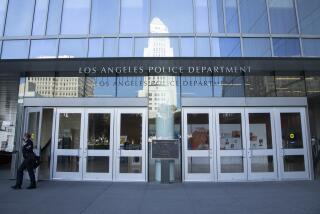Taxes Will Help Pay Bonuses
- Share via
WASHINGTON — The Clinton Administration has agreed to use $31 million in taxpayer money to pay a third of the $92 million in bonuses that top officials of Martin Marietta Corp. and Lockheed Corp. granted themselves for staging the largest merger in Pentagon history, Defense Department officials said Thursday.
The government-subsidized merger of Lockheed and Martin Marietta, which will eliminate 30,000 jobs, mainly in California, was completed Wednesday.
Some stockholders argued that the bonuses, including $8.2 million for Martin Chairman Norman Augustine, are excessive and unwarranted. Lockheed Martin has $11.6 billion in annual military sales.
“I thought it was excessive as a shareholder, and I certainly think it’s excessive as a taxpayer,” said Jon Lukomnik, deputy comptroller for pensions for New York City.
Defense officials have said the merger will let the federal government reap lower costs over the long term.However, defense officials made no public comment on the bonuses. Had Administration officials opposed them, industry representatives say, Augustine and Lockheed officials would have scrapped the plan.
“We couldn’t have gone ahead with it (the bonuses) in the face of Pentagon objections,” said one senior Lockheed official who spoke on condition he not be identified.
Defense Secretary William Perry and his deputy John Deutch were employed as consultants by Martin Marietta before they joined the Defense Department, and they have close relationships with Augustine. But Pentagon spokesman Ken Bacon said he was unaware of any roles Perry and Deutch may have played in the decision to approve the bonus plan and pay $31 million toward the total.
In response to questions by Newsday, Bacon said Lockheed and Martin Marietta submitted the bonus package plan to Defense Department officials before details were disclosed to the public. The Pentagon analysis showed the bonus package to be $10 million more than corporate officials had claimed by last December.
Bacon said defense officials agreed to pay $31 million of the bonus package in two categories. According to Bacon, $19 million stemmed from benefit claims made under older contracts and will be paid out in lump sums. In addition, $12 million relates to cost claims not yet submitted under future contracts, he said, and will be paid by Pentagon over a three-year period. According to Bacon, corporate officials indicated that $62 million, or two-thirds of the bonus payments, would come from Lockheed Martin profits.
Even so, the $31-million payment by the Pentagon toward the bonus package comes on top of an estimated $1-billion taxpayer subsidy to Lockheed Martin from the Administration.
As a result of a major policy change last year, the Pentagon has agreed to use taxpayer dollars to subsidize defense industry mergers as part of Clinton’s plan to preserve companies that build U.S. weapons. Under that policy, Lockheed Martin will be entitled to an estimated $1-billion Pentagon payment to cover such costs as plant shutdowns, employee relocation and other merger expenses.
Sen. Charles Grassley (R-Iowa), a leading critic of Pentagon payments to defense industry executives, said the undisclosed bonus funding needs a closer look.
“Last year’s defense appropriations act placed strict limits on the use of taxpayer money for executive compensation,” Grassley said in a statement.
Grassley, chairman of the Senate Judiciary subcommittee on administrative oversight, said he will push for a review of the merger.
Defense officials emphasized in their meetings with company officials last December that the Pentagon would bar any attempt by Lockheed Martin officials to use that $1 billion for this bonus package, Bacon said.
More to Read
Inside the business of entertainment
The Wide Shot brings you news, analysis and insights on everything from streaming wars to production — and what it all means for the future.
You may occasionally receive promotional content from the Los Angeles Times.










